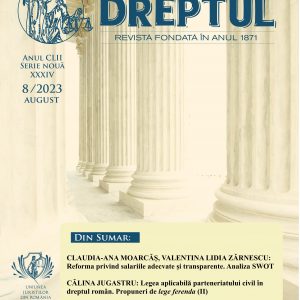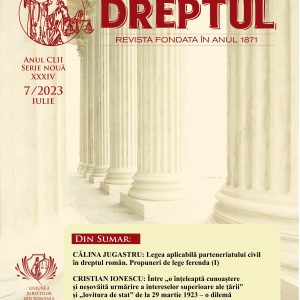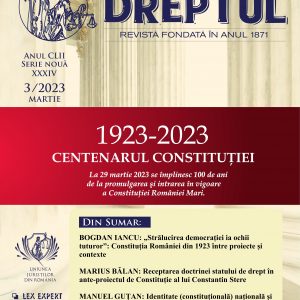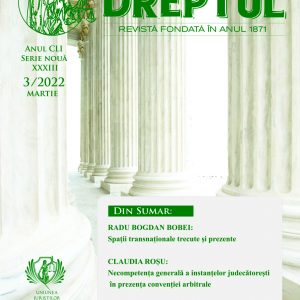-
 The globalization phenomenon is inevitably leading to a development, without precedent, of the international trade, in general, and of the freight, a situation that emphasizes the current complex issue of defining the law applicable to the international contract of maritime freight, and also the enhancement of afforts for the elaboration of an uniform frame applicable to international trade contracts in general, by the specialized institutions – UNCITRAL, UNIDROIT, the Hague Conference on international private law; the existence of an uniform law proves to be the best solution in order to avoid difficult issues caused by the conflict of laws, process which is constantly developing without achieving the elaboration of an universal interstate convention, that could unify the conflict solutions applicable to all international trading contracts, and consequently, at least for the time being, the conflict of laws is not completely eliminated. From this perspective, the law applicable to the international charter party has been analyzed according to the European Committee Regulation no. 593/ 2008 of the Europea Parliament and Council regarding the law applicable on contractual obligations – Rome I, and according to the inter-American Convention on the law applicable on international contracts (CIDIP Convention).
The globalization phenomenon is inevitably leading to a development, without precedent, of the international trade, in general, and of the freight, a situation that emphasizes the current complex issue of defining the law applicable to the international contract of maritime freight, and also the enhancement of afforts for the elaboration of an uniform frame applicable to international trade contracts in general, by the specialized institutions – UNCITRAL, UNIDROIT, the Hague Conference on international private law; the existence of an uniform law proves to be the best solution in order to avoid difficult issues caused by the conflict of laws, process which is constantly developing without achieving the elaboration of an universal interstate convention, that could unify the conflict solutions applicable to all international trading contracts, and consequently, at least for the time being, the conflict of laws is not completely eliminated. From this perspective, the law applicable to the international charter party has been analyzed according to the European Committee Regulation no. 593/ 2008 of the Europea Parliament and Council regarding the law applicable on contractual obligations – Rome I, and according to the inter-American Convention on the law applicable on international contracts (CIDIP Convention). -
 Fiducia is a legal institution brought into the Romanian national legislation by the entry into force of the New Civil Code. Introducing the institution of fiducia in the national law is the result of adapting national legislation to the new today’s legal and economic realities. The new Civil Code includes regulations applicable to fiducia with / without extraneity element. Regulation of this new institution has theoretical and practical significance as the procedure is a way of protection from creditors. Applying these regulations to particular factual situations requires knowledge and analysis of specific elements of fiducia.
Fiducia is a legal institution brought into the Romanian national legislation by the entry into force of the New Civil Code. Introducing the institution of fiducia in the national law is the result of adapting national legislation to the new today’s legal and economic realities. The new Civil Code includes regulations applicable to fiducia with / without extraneity element. Regulation of this new institution has theoretical and practical significance as the procedure is a way of protection from creditors. Applying these regulations to particular factual situations requires knowledge and analysis of specific elements of fiducia. -

-

-
 Analyzing the jurisprudence of the past three decades whereas tort law is concerned, one can easily find some gray areas, where the doctrinal principles developed so far seem to have fallen behind the realities of our modern society. Such a gray area is being analyzed by the author of this study, and it is attributed by modern doctrine to the jurisprudence applying the precautionary principle. Developed in the area of international public law, adapted to private law, and embraced by modern doctrine, the precautionary principle is a prominent figure in European legislation, as well as in our national laws, and lately also in court decisions.
Analyzing the jurisprudence of the past three decades whereas tort law is concerned, one can easily find some gray areas, where the doctrinal principles developed so far seem to have fallen behind the realities of our modern society. Such a gray area is being analyzed by the author of this study, and it is attributed by modern doctrine to the jurisprudence applying the precautionary principle. Developed in the area of international public law, adapted to private law, and embraced by modern doctrine, the precautionary principle is a prominent figure in European legislation, as well as in our national laws, and lately also in court decisions. -
 The dilemma on the bicameralism or unicameralism of the EC/EU legislator has existed for a long time. Not a few times, given the name of Parliament, operating with relative similarities regarding the states as subjects of international law, it was considered that it was and remained the legislature of the EC/EU. Over time, primary law and practice were likely to clarify things. Thus, at the beginnings of the Community construction, the Council acted as genuine supreme legislator, which had been gradually joined, as an institution of political control, consultation, cooperation and co-decision, by the European Parliament, so that currently the two institutions are equally involved in the legislative process of a two-chamber system.
The dilemma on the bicameralism or unicameralism of the EC/EU legislator has existed for a long time. Not a few times, given the name of Parliament, operating with relative similarities regarding the states as subjects of international law, it was considered that it was and remained the legislature of the EC/EU. Over time, primary law and practice were likely to clarify things. Thus, at the beginnings of the Community construction, the Council acted as genuine supreme legislator, which had been gradually joined, as an institution of political control, consultation, cooperation and co-decision, by the European Parliament, so that currently the two institutions are equally involved in the legislative process of a two-chamber system. -
 Given the importance that cybercrime is acquiring, the author has appreciated as being necessary to make an analysis on the applicability of self-defence and state of necessity in the context of cybercrime. Having as premise the necessity of justifying the retaliation in the virtual environment, the author has attempted to identify arguments in order to support the thesis according to which the self-defence and the state of necessity may find their applicability including in this area. Beyond analyzing the problematic issues related to this topic, we have tried, therefore, to emphasize the hypothetical situations in which a cyber (digital) attack is likely to give an outline to the state of self-defence or to the state of necessity.
Given the importance that cybercrime is acquiring, the author has appreciated as being necessary to make an analysis on the applicability of self-defence and state of necessity in the context of cybercrime. Having as premise the necessity of justifying the retaliation in the virtual environment, the author has attempted to identify arguments in order to support the thesis according to which the self-defence and the state of necessity may find their applicability including in this area. Beyond analyzing the problematic issues related to this topic, we have tried, therefore, to emphasize the hypothetical situations in which a cyber (digital) attack is likely to give an outline to the state of self-defence or to the state of necessity. -
 After the author has analyzed in a previous study the need to take into account the legitimate defence in the field of cybercrime and has emphasized the aspects of the conditions of the attack, in this material there are analyzed the legitimate retaliation and the state of necessity. In this context, the author has tried to emphasize the problems that may arise in relation to the conditions relating to defence (legitimate retaliation), also seeking to provide a theoretical framework capable of providing applicability to the institution of self-defence. An important aspect analyzed in this paper has been the putative self-defence, which could be a key aspect in the discussion on the legitimate retaliation. Equally, it has been examined inclusively the institution of the state of necessity, also drawing conclusions on the relationship between this institution and the institution of self-defence.
After the author has analyzed in a previous study the need to take into account the legitimate defence in the field of cybercrime and has emphasized the aspects of the conditions of the attack, in this material there are analyzed the legitimate retaliation and the state of necessity. In this context, the author has tried to emphasize the problems that may arise in relation to the conditions relating to defence (legitimate retaliation), also seeking to provide a theoretical framework capable of providing applicability to the institution of self-defence. An important aspect analyzed in this paper has been the putative self-defence, which could be a key aspect in the discussion on the legitimate retaliation. Equally, it has been examined inclusively the institution of the state of necessity, also drawing conclusions on the relationship between this institution and the institution of self-defence. -
 La protection et mise en valeur du patrimoine culturel et naturel constituent deux des vecteurs de l’actuelle politique d’aménagement du territoire au Portugal. Il ne s’agit pas d’un aspect étonnant, prise en considération la richesse et diversité des biens (culturels et naturels) que le Pays dispose. Ainsi, et en ce qui concerne le patrimoine naturel, l’ensemble d’aires classées à l’abri du Réseau 2000 et du Réseau National des Aires Protégées représentait, déjà en 2005, 21,3% du territoire national, s’élevant même, dans certaines zones, à 50% de la surface total (comme il arrive dans la NUT de Serra da Estrela) 1. À son tour, les actions de sauvegarde et de mise en valeur du patrimoine culturel ont augmenté exponentiellement, se traduisant dans une croissance considérable du nombre de biens classés, qui a augmenté près de 85% entre 1980 et 2003. En effet, il y a des aires avec une grande concentration de patrimoine classé, comme il arrive au Norte Litoral, Área Metropolitana do Porto (avec extension vers Douro), Beira Interior, Área Metropolitana de Lisboa (avec extension vers Vale do Tejo), Alto Alentejo et Alentejo Central, avec un grand poids dans le patrimoine archéologique2.
La protection et mise en valeur du patrimoine culturel et naturel constituent deux des vecteurs de l’actuelle politique d’aménagement du territoire au Portugal. Il ne s’agit pas d’un aspect étonnant, prise en considération la richesse et diversité des biens (culturels et naturels) que le Pays dispose. Ainsi, et en ce qui concerne le patrimoine naturel, l’ensemble d’aires classées à l’abri du Réseau 2000 et du Réseau National des Aires Protégées représentait, déjà en 2005, 21,3% du territoire national, s’élevant même, dans certaines zones, à 50% de la surface total (comme il arrive dans la NUT de Serra da Estrela) 1. À son tour, les actions de sauvegarde et de mise en valeur du patrimoine culturel ont augmenté exponentiellement, se traduisant dans une croissance considérable du nombre de biens classés, qui a augmenté près de 85% entre 1980 et 2003. En effet, il y a des aires avec une grande concentration de patrimoine classé, comme il arrive au Norte Litoral, Área Metropolitana do Porto (avec extension vers Douro), Beira Interior, Área Metropolitana de Lisboa (avec extension vers Vale do Tejo), Alto Alentejo et Alentejo Central, avec un grand poids dans le patrimoine archéologique2. -

-

-
 During the execution of custodial sentences, detainees participate in various activities and educational program, psychological assistance and social assistance that facilitate the adjustment to prison life, support social reintegration and create the framework for learning the rules of social coexistence in the outside society. The central element of this research is the religious freedom of persons deprived of their liberty and the specific way of exercising it in places of detention, considering that a balance must be preserved between the fundamental right to freedom of thought, conscience and religion and interest of penitentiary administrations to maintain security in places of detention, respect for the rights of other detainees. Bearing in mind the content, but also the limits of religious freedom, the exercise of this fundamental right in places of detention has some particular characteristics because it influences the life in prisons, the diet of detainees, but also their other rights, and in this regard the special rules of exercise religious freedom can be determined on the basis of principles deriving from both national and European Court of Human Rights’ case law.
During the execution of custodial sentences, detainees participate in various activities and educational program, psychological assistance and social assistance that facilitate the adjustment to prison life, support social reintegration and create the framework for learning the rules of social coexistence in the outside society. The central element of this research is the religious freedom of persons deprived of their liberty and the specific way of exercising it in places of detention, considering that a balance must be preserved between the fundamental right to freedom of thought, conscience and religion and interest of penitentiary administrations to maintain security in places of detention, respect for the rights of other detainees. Bearing in mind the content, but also the limits of religious freedom, the exercise of this fundamental right in places of detention has some particular characteristics because it influences the life in prisons, the diet of detainees, but also their other rights, and in this regard the special rules of exercise religious freedom can be determined on the basis of principles deriving from both national and European Court of Human Rights’ case law.
